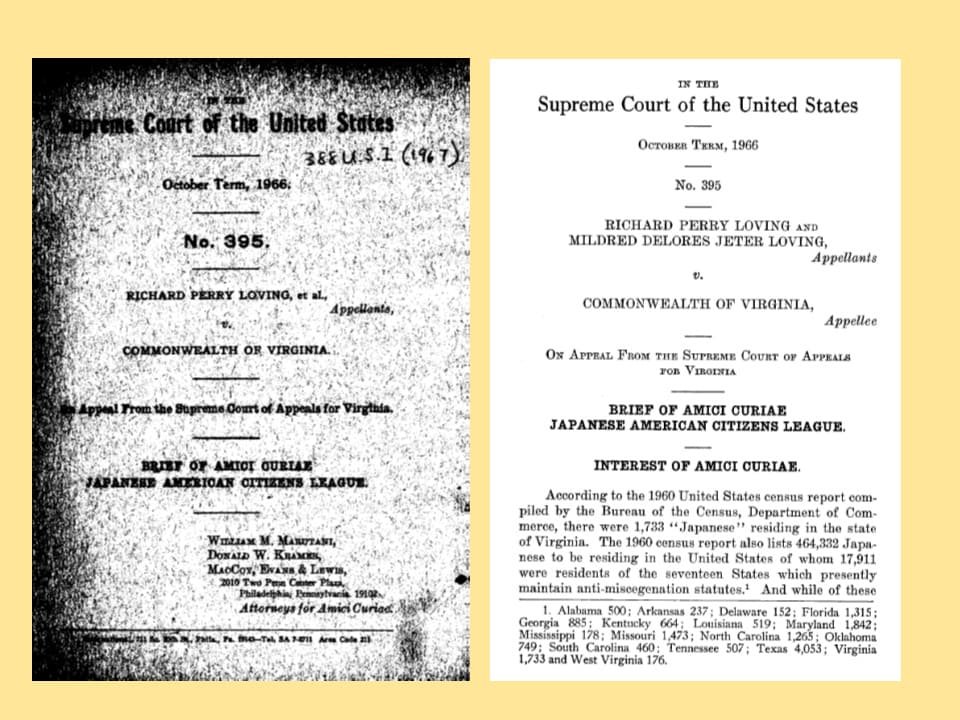Loving v. Virginia: The JACL Argues for Interracial Marriage
When the United States Supreme Court held in 1967 that bans on interracial marriages were unconstitutional, a Japanese American civil rights group helped win this victory.
In the 1960s, Virginia was one of 17 states that banned interracial marriages. Virginia’s ban declared that “all marriages between a white person and a colored person shall be void without any decree of divorce or other legal process” and defined “white” as a person “who has no trace of whatsoever of any blood other than Caucasian.”
The Landmark Case of Loving v. Virginia
Many groups supported Mildred and Richard Loving when they challenged Virginia’s law. The Japanese American Citizen League was the only one that filed an amicus brief and was given leave to argue before the Supreme Court.
During oral argument, Supreme Court justices had two questions for William Marutani, the JACL’s general counsel at the time.
William Marutani's Contribution to the Case
First, Marutani was asked if Virginia’s law would meet equal protection requirements if it banned all people of all races from intermarrying. He argued that the law would still be unconstitutional because it was, at heart, a “white supremacy” law, in addition to being one that was unworkable practically.
Second, Marutani was asked if Japan prohibited interracial marriages. He had already introduced himself as a Nisei – an American born and raised in the United States – and said he did not know. He said that his mother might have objected to his marrying a white person by “custom,” but the state should have no role in this area.
Later, Virginia’s attorney tried to defend the state’s ban as preventing only marriages between white and “colored” people. This argument was odd and probably just wrong since Virginia’s Supreme Court had upheld its ban to annul the marriage of a Chinese man and a white woman just a decade earlier in the Naim v. Naim case.
The Supreme Court's Historic Decision
Ultimately, the Supreme Court held Virginia’s ban unconstitutional for depriving the Lovings of liberty without due process of law. In a footnote, the Supreme Court said that it need not decide the equal protection argument that some justices had been thinking about because “we find the racial classifications in these statutes repugnant to the Fourteenth Amendment, even assuming an even-handed state purpose to protect the ‘integrity’ of all races.”
William Marutani's Legacy Beyond Loving v. Virginia
As for Marutani, he later became the first Asian American judge in Pennsylvania. He also served on a commission that studied the incarceration of Japanese Americans during World War II and recommended that the U.S. government issue a formal apology and make reparations payments, which happened in the 1980s.
Stephen Chahn Lee has written about Asian American legal history throughout his time as a lawyer, illuminating the pivotal legal battles fought by Asian Pacific Americans and their role in shaping the rights and freedoms we uphold today. This article was one of a series that Stephen wrote in 2023 and that grew out of an event that Stephen organized for the United States District Court of the Northern District of Illinois, the Federal Bar Association Chicago Chapter, the Asian American Bar Association of Greater Chicago, and other bar associations.
For further insights into Loving v. Virginia or legal guidance with healthcare fraud defense, please contact Stephen Lee Law.
Sources
Muto, David. "An Unsung Hero in the Story of Interracial Marriage." New Yorker, November 17, 2016. Read here.
"Oral Argument Transcript of Loving v. Virginia." Access online.
I would like to give special thanks to Nancy Marutani for providing a copy of the Japanese American Citizens League's amicus brief and for sharing insights about her father, William Marutani.

